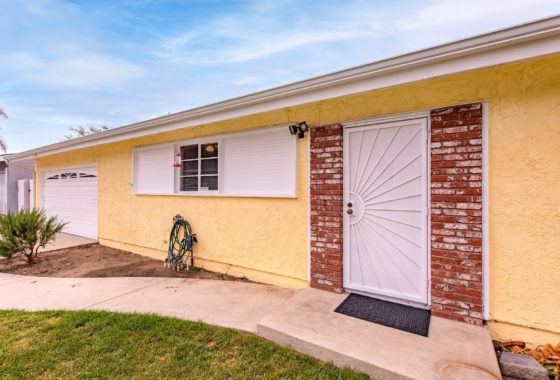 Home Buyers many times ask Home Sellers for concessions or assistance when they make an offer to purchase a home. The typical request from a home buyer is for closing costs, a home warranty, repairs or for the seller to include certain personal property items for sale. This article will focus on closing cost requests from home buyers.
Home Buyers many times ask Home Sellers for concessions or assistance when they make an offer to purchase a home. The typical request from a home buyer is for closing costs, a home warranty, repairs or for the seller to include certain personal property items for sale. This article will focus on closing cost requests from home buyers.
The following information pertains to California real estate only. Real estate settlement and closing procedures vary from state to state, so if you are looking for information for real estate transactions in a state other than California, the information below may not apply to your situation.
As the Simi Valley housing market has lost value and sales have slowed, the requirements for buyers to get financing has become difficult at the same time. The Simi Valley real estate market has seen the most activity in homes selling under $450,000. The buyers in this price range typically have low down payment offers and do not have significant reserves or savings. The FHA loan program allows those buyers with limited resources to purchase homes with as little as 3 1/2% down. For Simi Valley this translates into approximately $8000-$15,000 minimum down payment needs; the FHA program helps these buyers get into homes.
Looking at Simi Valley homes selling for under $450,000, the typical closing costs associated with those home purchases can range in the $8000-$10,000 range. It has been a pretty common practice for buyers to write an offer asking the seller to concede up to 3% of the sale price to assist the buyer with these closing costs. While not all sellers have the ability to make this concession, the buyers will add this figure on top of their offer price so the seller will realize a net sales price closer to what is acceptable to the seller.
In 2010 the federal government changed the Good Faith Estimate (GFE) and tightened down regulations on this form to protect buyers from overpaying fees associated with obtaining financing. Once the buyer’s lender issues the GFE, the lender is bound by those numbers and has very few options to increase any of the figures on that statement. The 2010 GFE does allow for some minor adjustments, but overall the buyer can feel pretty good about the actual closing costs associated with their purchase and loan after receiving this document. These new regulations with the GFE have created an issue in how buyers should ask for a closing cost credits from the sellers. If these credits are asked for without consideration of the new GFE requirements, the buyer can end up paying more for the property than they intended.
For example,
- The buyer asks for $10,000 credit toward closing costs in their offer to the seller.
- The seller is clear that they would like to receive no less than $400,000 for their property.
- The buyer’s offer is for $410,000 with the seller crediting back $10,000 toward the buyer’s closing costs.
- The seller accepts the offer and escrow is opened.
- The buyer now makes loan application with their lender.
- A GFE statement is issued within three days of the loan application outlining all the buyers costs.
- Those buyer costs total $8,000.
- The seller’s obligation is only $8,000 and the $2,000 difference is now realized by the seller in a net sale price of $402,000.
- The buyer just overpaid $2,000 more for the property than they originally intended to.
The example above outlines one of the problems Simi Valley home buyers may encounter when asking for closing costs to be credited by the sellers.
Some might say, ” when the buyer makes loan application, shouldn’t the lender set all the fees on the GFE statement to equal the $10,000?” The 2010 GFE was designed to outline and identify the costs to obtain financing, so buyers could go out and compare the costs between different lenders. How would it be to the lender’s advantage to inflate the costs and fees; just to try and burn up a concession/credit from the seller? Also, why would anyone want to pay more for property or pay more for costs than they need to?
If you are a buyer who is considering asking for a seller concession in closing cost assistance, understand the ramifications of such requests. If reserves/savings are one of the driving issues into asking for this type of seller concession that is one thing, but if you are asking for the seller concession while you have the money to pay for these closing costs, consider the following:
- Your property will be assessed for property taxes in the amount of the sales price. Is increasing the sales price worth paying additional property taxes over the course of time you own the property?
- By offering more than the original listing price to cover your closing costs, remember you will be paying interest on the higher purchase loan amount for next 30 years (if your loan is amortized on a 30 year schedule). I’ve always felt that home buyers should deeply reconsider (if possible) financing closing costs for 30 years. It’s does not make much since to pay interests on fees, since the first 20 years of the 30 year amortization schedule is weighted toward paying down the interest on the note.
Last, if you’re reading this article and you end up educating and instructing your real estate agent on these issues, ask yourself how well you’re being represented by an agent who’s not aware of these issues. If your real estate agent is not aware of issues as important as the impact of closing costs on your pocketbook during negotiations of your home purchase; then what else are they unaware of that may leave your money on the table or put you at a disadvantage in negotiations?
My sellers will gladly accept the additional funds if your closing costs are overstated in your original offer. Wouldn’t you feel better if you had an agent representing you trying as hard as they can to make sure you’re not leaving money on the table? Call or text (805) 432-7705
Related Articles:

I like your fantastic web site, I was searching for this all over.
best regards,
Ron
Heya i’m for the first time here. I came across this board and I in finding It really useful & it helped me out a lot.
I’m hoping to offer one thing back and aid others such as you helped me.
Like your site overall but your example here is incorrect. Seller credit of $10,000 will offset deposit required if closing costs are only $8,000. Buyer would simply deposit less money. The loan amount is set already by this stage. Total proceeds buyer would have to bring to the table will just decrease. (I reviewed one of my settlement statements where I received both a seller credit and a lender credit and it simply gets added to my credit column and my 20% down payment ended up being less than 20%.)
In addition, for most first time home buyers and FHA buyers, $10,000 cash in hand NOW is monumentally more important than caring about financing cost over a 30 year loan. First, VERY few people would stay in that mortgage 30 years (most would sell the home or refinance well before). Second, $10,000 over 30 years is pretty minimal (roughly $50/month). It would take 200 months or almost 17 years before you pay extra $10,000 in mortgage payments for borrowing additional $10,000. $10,000 now is far more practical than $50/month spread out over 17 years…
Sorry but actually you are not correct. There is no automatic offset to the deposit. A closing cost credit from the Seller to the buyer is for closing costs. The buyer’s deposit is not a closing cost.
The Buyer would have to specifically state in their request that any unused portion of the closing cost credit is to be reduced from the sale price. But 99.9% of Buyer’s agents that write these requests, never include that additional language.
There is a cap on how much closing cost credit a buyer can ask for. Many times we see credit requests that exceed what is allowed for. Simply put if the closing cost credit the buyer is asking from the Seller is $10,000.00 and the Buyer lender’s actual closing costs are $8,000.00; the Seller is under no obligation to reduce the price an additional $2,000.00. Nor will the $2,000 difference automatically offset the deposit amount.
Additionally the Buyer cannot receive cash out either. So it is very important when the offer is structured with a Seller credit to the Buyer or any negotiated credits from Seller to buyer, are structured properly. Buyer’s agents typically do not properly structure the request and the Buyer is given an unrealistic expectation and a surprise at closing when they don’t get the credit their agent lead them to believe they were getting.